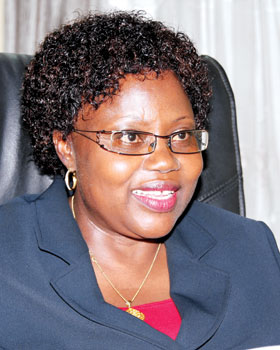
The current Kenyan government became the first government to be appointed and sworn in based on the new constitution. There have been a few hiccups, but they have apparently been doing some things right. Germany through its agency, GIZ, that is in charge of cooperation between the German government and governments from other countries; has lauded the transparency shown within the Kenyan government in regards to the national budget.
The current Kenyan constitution stipulates:
“There shall be openness and accountability in financial matters … public money shall be used in a prudent and responsible way … and fiscal reporting shall be clear”.
To ensure the stipulation by the constitution has been fulfilled, the Controller of budget, Ms Agnes Odhiambo was appointed. Ms Odhiambo was appointed in 2011 by the president and will hold office for eight years.
According to the GIZ who ran a program with the CoB “Support to Public Finance Reforms in Kenya”, on behalf of the Federal Ministry of Economic Cooperation and Development (BMZ);
“the CoB and her staff … understand the mandate and functions of the office arising from the constitution,”
“Despite the short term in office, the work of the CoB already caused a lot of public attention as the various “Budget Implemen- tation Review Reports” published so far unveiled a major lack in the absorption of funds by the MDAs on the national and regional (county) level. Although a bumpy road lies ahead, the OCoB is on the right track to establish itself as an important player in the Kenyan PFM system.”
She was interviewed by the GIZ on behalf of the Federal Ministry for Economic Cooperation ans Development (BMZ), here is what she had to say about her office:
Why was the Controller of Budget established as an independ- ent office in Kenya instead of integrating its tasks into other public finance institutions?
The Constitution of Kenya 2010 provides for various principles of public finance, which can only be performed if the Office of the Controller of Budget (OCoB) can make decisions without undue influence from any authority or office. The office gives advice to the Parliament that can result in stoppage of funds to any gov- ernment entities. Hence, an independent office is required that can give objective and unbiased reports. Furthermore the Con- troller of Budget is expected to oversee budget implementation in-year, in addition to approving the release of money from public funds, including the county revenue funds. This is in contrast with the 1963 Constitution, which precluded the Office of Controller and Auditor General (CAG) from overseeing budget implementa- tion. The office of Controller and Auditor General’s role of audit at the time conflicted with its control function of the budget implementation. The 2010 Constitution has also restructured the mandate of collection, custody and management of public funds by splitting the former CAG into the Office of the Controller of Budget and the Auditor General. The change effectively means that the Controller of Budget is an independent office that has power to control, monitor, evaluate, review, and advise on budget implementation with the aim of ensuring prudent use of re- sources, as well as promoting transparency and accountability of the public finance system. These provisions require an independ- ent office that cannot be easily manipulated by any other institution.
What major challenges do you face in exercising your mandate and what was your biggest success so far?
The legal framework to facilitate the implementation of the devo- lution process in Kenya is not fully developed yet, thus making it difficult to oversee implementation of the budget on the county level. Also the county governments lack adequate capacities and institutional arrangements (e.g. internal control systems, infra- structure, IT) for budget preparation and execution. Other chal- lenges include the low absorption of budget resources by some of the government entities and dealing with huge resource alloca- tions that have been budgeted to non-core activities both at national and county government levels. A pressing question in Kenya is how to deal with the huge wage bill and large staffing levels in some entities which is threatening to derail the county ́s development. Furthermore, an effective monitoring framework to control the implementation of projects as well as an adequate financial and reporting system still has to be established.
Despite these many challenges and its short term of existence, the office of the Controller of Budget has managed to become operational by developing a comprehensive strategic plan to guide its activities like recruiting staff and setting up the head office and forty seven (47) county offices to facilitate the execu- tion of its mandate. In order to address the slow absorption of budget resources by the various government entities the office has agreed with high-level executives on measures to be taken to improve project implementation that are being introduced now. Last but not least the office has developed guidelines for with- drawal of funds from the public funds to be used by the national and county governments.
What is the most pressing issue your office has to deal with at the moment?
One of the most pressing issues the office has to deal with at the moment is the inadequate funding and lack of sufficient budget- ary allocation to support all our operations. This also affects the capacity building of the office in various skills. Furthermore we had to develop an effective monitoring framework for budget implementation for use by the office. Also thanks to the support of GIZ we have recently made some major improvements on the latter.
What impact does your work have on the proper management of public funds in Kenya?
The impact has been great in streamlining the debt repayment procedures which require proper documentation before approval for the release of funds. More importantly, all documentation for each loan agreement are now readily available. The budgets prepared by the various government entities must now comply with the law before release of funds. Moreover, there are also in- year reports available to the Parliament and the Senate to fore- stall any misuse of funds in good time and deal with the culprits immediately.
In addition, the office has presence in the 47 county governments to support them and to deliver advice on budget preparation and execution.
Where do you see the PFM of Kenya in 2019, when your term of office is over?
The establishment of the office of Controller of Budget was in- tended to ensure there is fiscal discipline in the management of public resources and that the public fully participates in the fi- nancial management of their resources by providing social ac- countability audits to programmes and projects being imple- mented by the various levels of government. The strategic plan we have in place will ensure that we develop a framework and a forum for the public to fully participate in the management of their resources and also provide the necessary budget implemen- tation information to them.
Through regular monitoring and reporting on budget implemen- tation, the office envisages that by 2019, there will be improved management of public resources in terms of absorption, reporting and value for money. Additionally, the public’s participation in budget execution will have improved tremendously.









